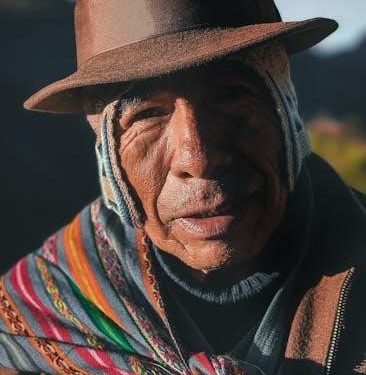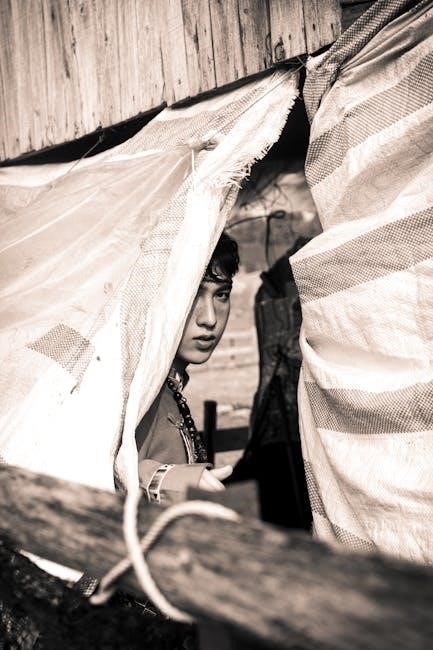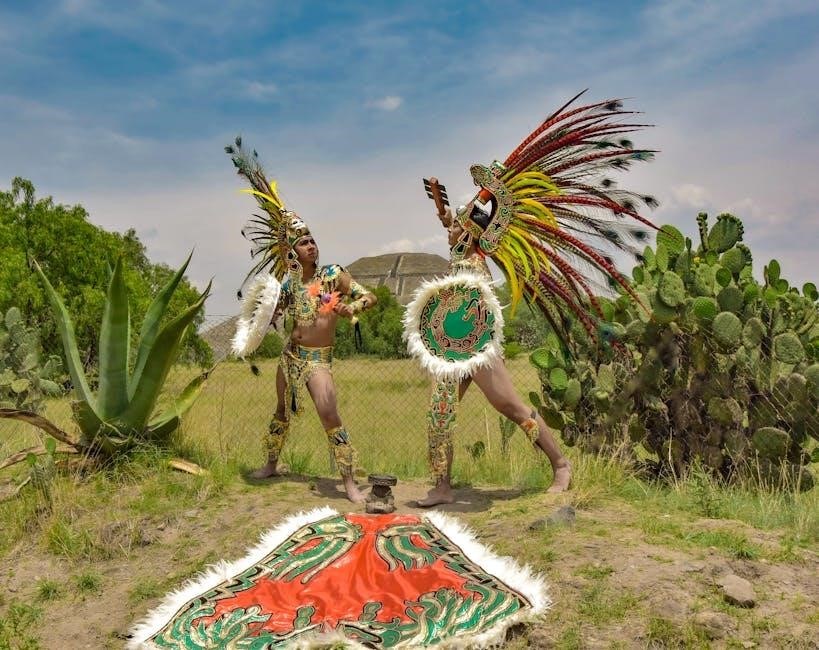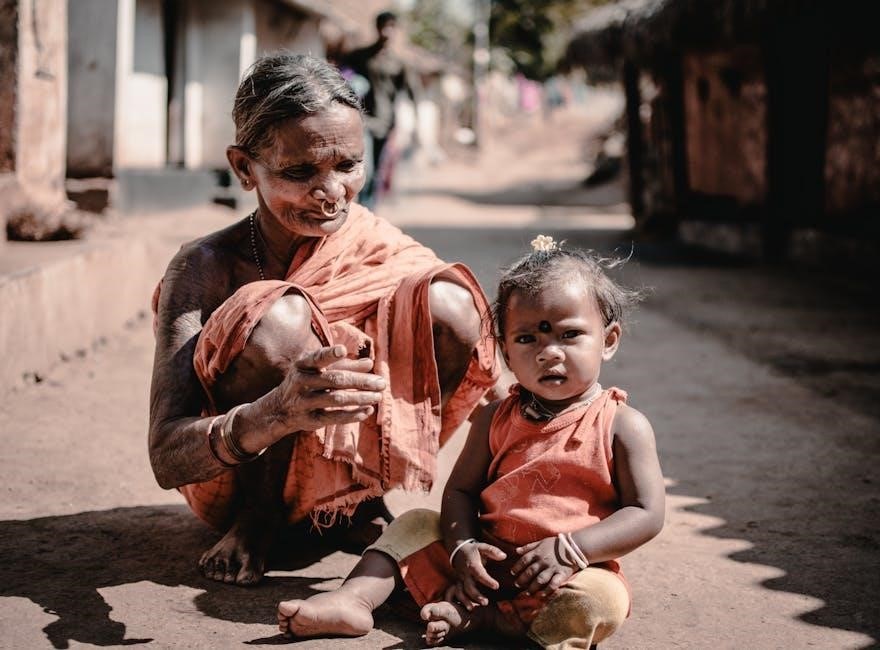
An Indigenous Peoples’ History of the United States by Roxanne Dunbar-Ortiz offers a groundbreaking perspective on U;S. history‚ centering Indigenous voices and experiences to challenge traditional narratives.
Overview of the Book and Its Significance
An Indigenous Peoples’ History of the United States reimagines U.S. history from the perspective of Native Americans‚ challenging dominant narratives that often marginalize or erase Indigenous experiences. Roxanne Dunbar-Ortiz meticulously chronicles the complex societies of pre-Columbian times‚ the devastating impact of European colonization‚ and the ongoing struggles for land and sovereignty. The book emphasizes Indigenous resistance and resilience‚ reframing U.S. history as a story of settler colonialism. Its significance lies in its unflinching critique of traditional historical accounts‚ offering a powerful counter-narrative that has sparked critical conversations about race‚ colonialism‚ and justice. This work is essential for understanding the true foundations of the United States and its ongoing legacy of Indigenous displacement and activism.
Author Roxanne Dunbar-Ortiz and Her Contributions
Roxanne Dunbar-Ortiz is a renowned historian‚ activist‚ and advocate for Indigenous rights. Her work challenges conventional historical narratives‚ emphasizing the agency and resilience of Indigenous peoples. As a scholar‚ she has contributed significantly to the field of Native American studies‚ offering critical perspectives on colonialism and settler colonialism. Her book‚ An Indigenous Peoples’ History of the United States‚ has been praised for its comprehensive and unflinching account of U.S. history from an Indigenous viewpoint. Dunbar-Ortiz’s contributions extend beyond academia; she is also a dedicated activist‚ supporting Indigenous sovereignty and self-determination. Her work has inspired educators and activists‚ reshaping public discourse on Native American history and rights. Her legacy continues to grow as her scholarship influences new generations of thinkers and leaders.

Historical Context of Indigenous Peoples in the United States
Indigenous peoples inhabited the Americas for millennia‚ developing complex societies. European colonization and U;S. expansion led to displacement‚ violence‚ and trauma‚ reshaping their histories and cultures forever.
Pre-Columbian Societies and Their Complexity
Pre-Columbian societies in the Americas were remarkably diverse and sophisticated. Indigenous peoples developed complex civilizations‚ such as the Mississippian mound-builders‚ Ancestral Puebloans‚ and Iroquois Confederacy. These societies showcased advanced engineering‚ governance‚ and cultural systems. For instance‚ the Iroquois Confederacy influenced early U.S. democratic ideals. Agriculture was central‚ with crops like maize‚ beans‚ and squash sustaining large populations. Trade networks spanned vast regions‚ facilitating the exchange of goods and ideas. Social hierarchies varied‚ from egalitarian hunter-gatherer groups to stratified chiefdoms. Spiritual practices were deeply intertwined with daily life‚ emphasizing harmony with nature. These societies were not static; they evolved over millennia‚ adapting to environmental and social changes. Their legacy underscores the richness and resilience of Indigenous cultures before European contact.
Impact of European Exploration and Colonization
European exploration and colonization had a devastating impact on Indigenous populations. The arrival of settlers brought diseases‚ such as smallpox‚ to which Native Americans had no immunity‚ leading to massive population declines. Colonizers exploited resources‚ displacing Indigenous peoples from their lands. Violence and forced labor were common‚ with Native Americans subjected to brutal treatment. The introduction of European agricultural practices disrupted traditional ways of life. Additionally‚ cultural suppression and the imposition of foreign belief systems further eroded Indigenous identities. These events set the stage for centuries of systemic oppression and marginalization. The long-term effects of colonization continue to affect Indigenous communities today‚ highlighting the need for reconciliation and justice.
Expansion of the United States and Native American Displacement
The expansion of the United States was marked by the forced displacement of Native American communities. The government’s westward expansion policies‚ such as Manifest Destiny‚ justified the taking of Indigenous lands. Many Native Americans were forcibly relocated through violent means‚ with events like the Trail of Tears exemplifying this brutality. The Indian Removal Act of 1830 legally facilitated this displacement‚ leading to significant loss of life and cultural heritage. The U.S. military and settlers often clashed with Native tribes‚ resulting in massacres and broken treaties. This period of expansion not only stripped Indigenous peoples of their land but also disrupted their social structures and ways of life‚ leaving lasting scars on their communities. The legacy of this displacement continues to impact Native Americans today.

Key Arguments and Themes in the Book
The book critiques traditional U.S. historical narratives‚ emphasizing Indigenous resistance and resilience against colonialism. It explores the concept of “settler colonialism” and its enduring impact on Native communities.
Critique of Traditional U.S. Historical Narratives
An Indigenous Peoples’ History of the United States challenges the conventional narrative of American history‚ which often marginalizes or erases Indigenous experiences. Roxanne Dunbar-Ortiz argues that traditional accounts glorify colonialism and the “frontier myth‚” portraying Native Americans as passive victims rather than active agents of resistance. The book emphasizes the violent displacement and genocide of Indigenous peoples‚ countering the romanticized notion of the U.S. as a land of opportunity. By centering Indigenous perspectives‚ it exposes the deeply ingrained colonialism that underpins the nation’s founding and development. This critique reshapes the understanding of U.S. history‚ revealing it as a story of settler colonialism rather than liberation.
Role of Indigenous Resistance and Resilience
An Indigenous Peoples’ History of the United States highlights the enduring resistance and resilience of Native American communities. Roxanne Dunbar-Ortiz vividly portrays how Indigenous peoples actively resisted colonialism‚ slavery‚ and land theft‚ challenging the notion of passive victimhood. From armed uprisings to diplomatic negotiations‚ these acts of defiance underscored Indigenous sovereignty. The book also explores how Native cultures‚ languages‚ and traditions survived despite forced assimilation and genocide. Modern Indigenous activism‚ such as the Dakota Access Pipeline protests‚ reflects this legacy of resistance. By centering these stories‚ Dunbar-Ortiz reveals how Indigenous peoples have consistently fought for their rights‚ shaping the course of U.S. history in profound ways. Their resilience continues to inspire contemporary struggles for justice and self-determination.
Colonialism and the Concept of “Settler Colonialism”
Roxanne Dunbar-Ortiz’s An Indigenous Peoples’ History of the United States critically examines the concept of settler colonialism‚ distinguishing it from traditional colonialism. Settler colonialism involves the replacement of Indigenous populations with a new settler society‚ rather than exploiting existing labor. The book details how the United States expanded westward through policies of genocide‚ displacement‚ and forced assimilation‚ erasing Indigenous cultures and sovereignties. This framework reveals how the U.S; was built on the premise of Indigenous erasure‚ with settlers claiming land as their birthright. Dunbar-Ortiz argues that this colonial logic persists‚ shaping contemporary issues like land rights and racial inequality. By centering settler colonialism‚ the book challenges readers to confront the violent foundations of the U.S. and its ongoing impacts on Indigenous peoples.

Indigenous Peoples’ Struggles and Rights
Indigenous peoples have long fought for land rights‚ self-determination‚ and cultural preservation‚ facing systemic oppression and marginalization. Their struggles continue today‚ demanding justice and equity.
Historical Struggles for Land and Self-Determination
Indigenous peoples have faced centuries of displacement‚ violence‚ and marginalization in their struggles for land and self-determination. From the earliest colonial encounters to the forced relocation of Native American tribes during U.S. expansion‚ Indigenous communities resisted the erosion of their sovereignty. Treaties were often broken‚ and land was seized‚ leading to the loss of cultural and economic foundations. The federal government’s policies‚ such as assimilation and termination‚ further threatened Indigenous rights. Despite these challenges‚ Indigenous peoples maintained their identities and continued to advocate for justice. Roxanne Dunbar-Ortiz’s work highlights these historical struggles‚ emphasizing the resilience and organized resistance of Indigenous communities in the face of systemic oppression. Their fight for land and self-governance remains central to their survival and identity.
Modern-Day Challenges and Activism
Indigenous peoples in the United States continue to face modern-day challenges‚ including land dispossession‚ environmental degradation‚ and systemic discrimination. Activism has become a vital tool for addressing these issues‚ with movements like Idle No More and the Dakota Access Pipeline protests gaining national attention. Indigenous leaders advocate for land rights‚ cultural preservation‚ and self-determination‚ often challenging federal and state policies. Despite progress‚ barriers such as bureaucratic red tape and lack of representation persist. Grassroots organizations and tribal nations are fostering resilience through education‚ legal battles‚ and community empowerment. Roxanne Dunbar-Ortiz’s work underscores the importance of understanding historical oppression to address contemporary struggles‚ emphasizing the need for solidarity and systemic change to ensure Indigenous rights and sovereignty.

Impact of the Book on Public Discourse
An Indigenous Peoples’ History of the United States has sparked significant public debate‚ challenging traditional narratives of U.S. history and raising awareness of Indigenous struggles and rights.
Reception and Reviews of the Book
An Indigenous Peoples’ History of the United States has received widespread acclaim for its bold reinterpretation of U.S. history. Reviewers praise Roxanne Dunbar-Ortiz for her meticulous research and unflinching critique of colonialism. The book has been described as a “groundbreaking” and “essential” work‚ challenging traditional historical narratives. It has garnered attention in academic circles and beyond‚ sparking conversations about Indigenous rights and the legacy of settler colonialism. Educators and activists have embraced the book for its ability to reframe U.S. history from a Native perspective‚ making it a critical resource for understanding the nation’s past and present.
Education and Curriculum Development Inspired by the Book
Roxanne Dunbar-Ortiz’s work has significantly influenced education‚ prompting schools to revise U.S. history curricula. Educators have developed companion materials‚ such as An Indigenous Peoples’ History of the United States for Young People‚ to introduce these perspectives to students. The book has inspired teaching resources and workshops‚ encouraging a more inclusive understanding of history. By integrating Indigenous voices and experiences‚ it has become a vital tool for educators aiming to decolonize historical narratives. This shift reflects a broader movement to incorporate diverse viewpoints‚ fostering empathy and a deeper understanding of the nation’s complex past among future generations.
An Indigenous Peoples’ History of the United States reshapes understanding of U.S. history‚ offering a powerful narrative that challenges colonial myths and honors Indigenous resilience.
Legacy of the Book in Understanding U.S. History
An Indigenous Peoples’ History of the United States by Roxanne Dunbar-Ortiz has profoundly reshaped the way U.S. history is understood‚ offering a critical Indigenous perspective.
By challenging traditional narratives that erase Native American voices‚ the book has sparked essential discussions about colonialism‚ settler violence‚ and Indigenous resistance.
Its impact extends beyond academia‚ influencing curriculum development and public discourse‚ ensuring a more inclusive and accurate understanding of America’s past.
As a foundational text‚ it continues to inspire new generations to confront historical injustices and advocate for Indigenous rights‚ leaving a lasting legacy in redefining U.S. history.
Future Directions for Indigenous Peoples’ Rights
Building on the insights from An Indigenous Peoples’ History of the United States‚ future directions for Indigenous rights must prioritize land restitution‚ cultural preservation‚ and political self-determination.
Advocacy for policies that recognize Indigenous sovereignty and address historical injustices is critical‚ alongside efforts to dismantle systemic racism and inequality.
Education and awareness campaigns‚ inspired by the book‚ can empower communities to reclaim their histories and challenge colonial narratives.
Collaboration between Indigenous leaders‚ governments‚ and international organizations is essential to ensure equitable representation and protection of Indigenous rights globally.
By fostering unity and solidarity‚ Indigenous peoples can continue to assert their identities and demand a future rooted in justice‚ equality‚ and the preservation of their cultural heritage.